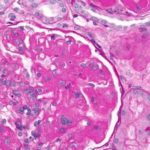1. More patients with systemic lupus erythematosus (SLE) who received high doses of iberdomide achieved SRI-4 response compared to placebo and other doses.
Evidence Rating Level: 1 (Excellent)
Study Rundown: Iberdomide is an immunomodulator that reduces the degradation of key transcriptional factors Ikaros and Aiolos to reduce inflammation contributing to disease in patients with systemic lupus erythematosus (SLE). Given promising results in a previous phase 2a trial, the randomized control trial sought to investigate its effect in patients with active SLE. Patients clinically diagnosed with moderate-to-severe SLE were randomized to receive either 0.45, 0.30, 0.15 mg iberdomide or placebo daily over 24 weeks. The primary endpoint was to assess the proportion of patients who achieved SLE responder index 4 (SRI-4) response composed of several scales of disease reduction in SLE. The study found that a significantly greater proportion of patients receiving 0.45 mg of iberdomide achieved SRI-4 response compared to all other doses and the placebo group. Groups receiving lower doses were unable to show differences compared to the placebo. Urinary tract and upper respiratory infections and low neutrophil count were common adverse events associated with iberdomide treatment. Taken together, this study supports the use of iberdomide is improving disease states in patients with SLE and larger efficacy studies are warranted. The results of this study are limited by stringent exclusion criteria and a relatively homogenous study population, limiting the generalizability of the data.
Click to read the study in NEJM
Relevant Reading: A cereblon modulator (CC-220) with improved degradation of Ikaros and Aiolos.
In-Depth [randomized controlled trial]: In this international, multicenter, phase 2 randomized control trial, 289 patients who met the criteria of having moderate-to-severe systemic lupus erythematosus (SLE) according to their SLEDAI-2K score and had high antinuclear antibody titer. Patients with neuropsychiatric SLE or kidney damage were excluded. Eligible patients were randomized in a 2:2:1:2 ratio to receive iberdomide at a dose of 0.45 mg, 0.3 mg, 0.15 mg, or placebo respectively once daily. The primary endpoint was to assess the proportion of patients who responded to treatment at 24 weeks according to the SLE Responder Index (SRI-4) which is a composite measure of SLEDAI-2K score reduction, no new disease according to the British Isles Lupus Assessment Group (BILAG) 2004 index, and no disease progression according to Physician’s Global Assessment (PGA). Secondary endpoint measures assessed the proportion of patients who experienced a decrease in SLEADAI-2K score by at least 4 points and the percentage of patients with a 50% decrease in disease severity and activity scores (CLASI-I/A). Safety and adverse events were also monitored. Analysis was performed with stratification for prednisone dosage and baseline SLEDAI-2K score by Cochran-Mantel-Haenszel test. The study found that 54% of patients receiving 0.45 mg of iberdomide achieved a response that was significantly greater than 35% of patients in the placebo group (P = 0.01). This increase in the 0.45 mg group was also significant when compared to patients receiving the other two dosages. For secondary endpoints, 56% of patients receiving 0.45 mg iberdomide had a reduction in SLEDAI-2K score by at least 4 points, which was significantly greater than the placebo group where only 36% improved. Pharmacodynamic analyses found that patients receiving iberdomide had more regulatory immune cell counts and reduction in type I interferon gene signatures compared to placebo. 78% of patients receiving 0.45 mg of iberdomide experienced an adverse side effect with upper urinary and respiratory tract infection, neutropenia, and influenza infection being the most common. Overall, the data support the continued investigation of the use of iberdomide in patients with moderate-to-severe SLE.
Image: PD
©2022 2 Minute Medicine, Inc. All rights reserved. No works may be reproduced without expressed written consent from 2 Minute Medicine, Inc. Inquire about licensing here. No article should be construed as medical advice and is not intended as such by the authors or by 2 Minute Medicine, Inc.


